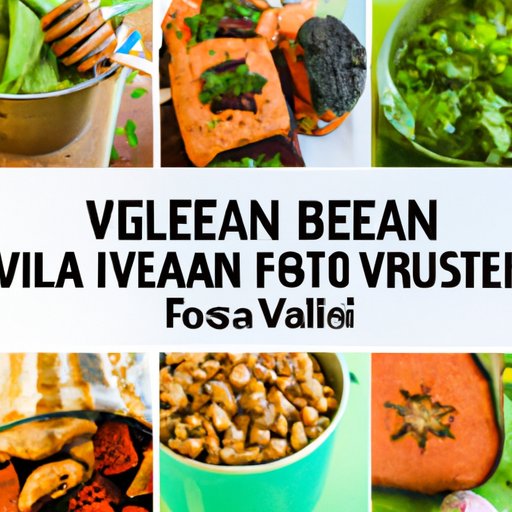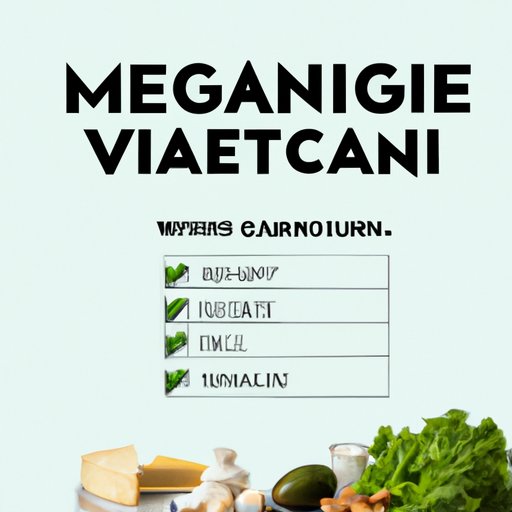Introduction – What is Protein and Why is it Important for Vegans?
Protein is an essential nutrient that plays an important role in building and maintaining muscle, bones, skin, and other tissues. It’s especially important for vegans because plant-based diets tend to be lower in protein than diets that include animal products. Fortunately, there are plenty of plant-based sources of protein that can help vegans get the nutrients they need.
A Guide to Plant-Based Protein Sources for Vegans
Vegans can easily meet their protein needs by including a variety of plant-based foods in their diets. Here are some of the best sources of plant-based protein:
Legumes
Legumes such as beans, peas, lentils, and peanuts are excellent sources of protein. They’re also rich in fiber, vitamins, and minerals. Legumes can be eaten on their own or used to make soups, salads, and other dishes.
Nuts and seeds
Nuts and seeds like almonds, walnuts, chia seeds, and hemp seeds are also good sources of plant-based protein. They’re also rich in healthy fats, vitamins, and minerals. Nuts and seeds can be eaten raw, roasted, or ground into nut butter.
Whole grains
Whole grains like quinoa, oats, and barley are high in protein and other nutrients. They can be cooked and eaten as a side dish, added to soups and salads, or used to make breads, cereals, and other baked goods.
Tofu, tempeh and other soy products
Tofu, tempeh, and other soy products are made from soybeans and are rich in protein. They can be cooked in a variety of ways, including stir-frying, grilling, baking, and more. Soy products are also a great source of calcium, iron, and other nutrients.
Nutritional yeast
Nutritional yeast is a type of deactivated yeast that has a cheesy, nutty flavor. It’s rich in B vitamins and protein and can be used as a condiment on salads, pasta, and other dishes.
Sprouted and fermented plant foods
Sprouted and fermented plant foods like miso, sauerkraut, kimchi, and tempeh are all excellent sources of plant-based protein. They’re also packed with probiotics, which can help improve digestion.
Exploring High-Protein Vegan Foods
In addition to the foods listed above, there are several vegan-friendly foods that are especially high in protein. Here are some of the best:
Beans and lentils
Beans and lentils are both excellent sources of plant-based protein. Lentils contain 9 grams of protein per cooked cup, while beans range from 7 to 15 grams of protein per cooked cup. Beans and lentils can be used in a variety of dishes, including soups, stews, salads, and more.
Quinoa
Quinoa is a grain that contains 8 grams of protein per cooked cup. It’s also high in fiber and other nutrients. Quinoa can be cooked and eaten as a side dish or used to make salads, soups, and other dishes.
Seitan
Seitan is a type of wheat gluten that has a chewy, meat-like texture. It’s often used as a plant-based alternative to meat and contains 21 grams of protein per 3-ounce serving. Seitan can be cooked in a variety of ways, including stir-frying, grilling, and more.
Hemp hearts
Hemp hearts are the hulled seeds of the hemp plant. They’re a great source of plant-based protein, with 10 grams of protein per 3 tablespoon serving. Hemp hearts can be sprinkled on salads, yogurt, oatmeal, and other dishes for a boost of nutrition.
Spirulina
Spirulina is a type of blue-green algae that is especially high in protein. It contains 8 grams of protein per 2 tablespoon serving and is also a great source of vitamins, minerals, and antioxidants. Spirulina can be added to smoothies, salads, and other dishes.
Top 10 Protein-Rich Foods for Vegans
Here is a list of the top 10 protein-rich foods for vegans:
- Lentils
- Chickpeas
- Tofu
- Tempeh
- Peanuts
- Almonds
- Cashews
- Chia Seeds
- Hemp Seeds
- Oats

Boost Your Protein Intake with These Delicious Vegan Recipes
Eating protein-rich foods is only part of the equation – you also need to make sure you’re eating enough of them. Here are some delicious vegan recipes that will help you boost your protein intake:
Curried lentil salad
This flavorful salad is easy to make and packed with protein. It contains 18 grams of protein per serving and can be served as a main course or as a side dish.
Vegetable stir fry
This simple stir fry is full of nutritious vegetables and protein-rich tofu. It contains 16 grams of protein per serving and can be customized with whatever vegetables you have on hand.
Black bean burgers
These vegan black bean burgers are a delicious way to get your protein. Each burger contains 11 grams of protein and can be served on a bun or wrapped in lettuce.
Lentil soup
This hearty soup is packed with protein and fiber. It contains 13 grams of protein per serving and can be enjoyed as a main course or a side dish.
Edamame hummus
This edamame hummus is a tasty twist on traditional hummus. It contains 10 grams of protein per serving and can be enjoyed with crackers, chips, or vegetables.
Quinoa pilaf
This quinoa pilaf is a flavorful side dish that packs a protein punch. It contains 8 grams of protein per serving and can be served with any meal.

How to Balance Your Macronutrients as a Vegan
In addition to getting enough protein, it’s important to make sure you’re getting the right balance of macronutrients. Here are some tips for balancing your macronutrients as a vegan:
Understanding macronutrients
Macronutrients are the three major classes of nutrients that provide energy to the body: carbohydrates, proteins, and fats. Each of these nutrients plays an important role in keeping your body healthy.
Finding the right balance
When it comes to macronutrient balance, it’s important to make sure you’re getting enough of each nutrient. Aim for a diet that consists of 40-60% carbohydrates, 10-30% protein, and 20-35% fat.
Tips for getting the right balance
To make sure you’re getting the right balance of macronutrients, try to include a variety of whole plant foods in your diet. Include plenty of fruits, vegetables, legumes, nuts, seeds, and whole grains. Also, limit processed and refined foods, which tend to be high in fat and low in other nutrients.
The Benefits of Eating Protein as a Vegan
Eating enough protein is essential for vegans, but there are also other benefits to eating protein. Here are some of the benefits of eating protein as a vegan:
Improved muscle growth
Protein is essential for muscle growth and repair. Eating enough protein can help support muscle growth and strength, which can be especially beneficial if you’re trying to build muscle.
Improved immunity
Protein helps to build and maintain the immune system. Eating enough protein can help keep your immune system strong and help protect you from illness and disease.
Improved digestion
Protein helps to break down food in the digestive tract. Eating enough protein can help improve digestion and make it easier for your body to absorb nutrients from the food you eat.
A Comprehensive List of Protein-Packed Foods for Vegans
Here is a comprehensive list of protein-packed foods for vegans:
- Legumes
- Nuts and seeds
- Whole grains
- Soy products
- Nutritional yeast
- Sprouted and fermented plant foods
- Beans and lentils
- Quinoa
- Seitan
- Hemp hearts
- Spirulina
- Lentils
- Chickpeas
- Peanuts
- Almonds
- Cashews
- Chia Seeds
- Hemp Seeds
- Oats
Conclusion
Eating enough protein is essential for vegans, but it doesn’t have to be difficult. There are plenty of delicious plant-based sources of protein, including legumes, nuts and seeds, whole grains, soy products, nutritional yeast, sprouted and fermented plant foods, beans and lentils, quinoa, seitan, hemp hearts, spirulina, lentils, chickpeas, peanuts, almonds, cashews, chia seeds, hemp seeds, and oats. Eating enough protein can help improve muscle growth, immunity, and digestion. With this comprehensive guide to vegan protein sources, you’ll have no trouble meeting your protein needs.
(Note: Is this article not meeting your expectations? Do you have knowledge or insights to share? Unlock new opportunities and expand your reach by joining our authors team. Click Registration to join us and share your expertise with our readers.)
